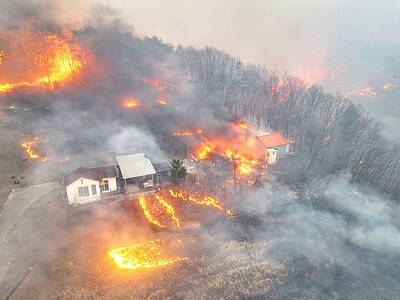As the end of middle school approached this year, Zhan Haite (占海特), 15, faced two choices: Attend vocational school in Shanghai in the fall or move to her ancestral home in distant Jiangxi Province to take the high-school entrance exam and study there.
Taking the test and going to senior-high school in Shanghai, where she had lived since she was four, was not an option.
Zhan is one of millions of children whose parents belong to China’s vast migrant workforce and are barred from taking senior-high school or college entrance exams where they live by half-century-old policies on household registration, or hukou (戶口).

Photo: Reuters
The hukou system has split China’s population in two for decades, affording different privileges and opportunities to urban and rural residents. It is a major challenge for China’s new economic policymakers under Chinese Vice Premier Li Keqiang (李克強) as they try to push urbanization as an engine of growth.
Not content with her choices, Zhan launched a microblog in May where she argued her case online, igniting a heated national debate.
In the process, she has become the poster child for a loose-knit, but growing campaign for equal education opportunities.
“She is, of course, very important because she is a victim, and all along we have been hoping one of the children who have been hurt by these policies would stand up and represent all the victims so that the community more broadly can pay attention to the issue,” said Xu Zhiyong (許志永), a Beijing civil rights lawyer, who has campaigned for people like Zhan.
Zhan, who has been home-schooling since May, seems comfortable in the role.
“I am representative of students like me, our needs, our hopes,” she said in the two-bedroom apartment where she lives with her parents, grandmother, brother and sister.
“People should be able to take the tests where they study. There is no need to debate this,” she said.
However, there has been debate and people have taken to the streets. Beijing police yesterday broke up a small protest and detained some of the demonstrators calling for hukou reform.
“We are doing this for the right of our children to an education,” one of the protesters, who gave his family name as Tie (鐵), told reporters on a freezing street.
“We want them to get rid of these restrictive rules on household registration and give equal rights to education. We will keep fighting for it,” he added.
For as long as there have been migrants, after market reforms started more than three decades ago, there have been complaints about the hukou system’s inadequacies. Discussion of hukou reform has circulated for years, but steps have been cautious.
China’s 230 million migrant workers have been the oarsmen of the world’s second-biggest economy, but have long been treated as second-class citizens with unequal access to education, health and other services tied to official residence status.
The education issue has been particularly divisive.
Zhan’s father, Zhan Quanxi (占全喜), was detained for several days this month after publicly protesting for education rights in central Shanghai, but criminal charges were dropped.
However, his online posts have been met with sharp criticism from Shanghai hukou holders, some of whom have claimed to be part of a “Shanghai Defence Alliance.”
The verbal mud-slinging reflects a battle over turf in big cities where high-school seats can help students get into top universities, said Ralph Litzinger, a professor of anthropology at Duke University who studies Chinese migrant issues.
“In an increasingly stratified and almost insanely competitive society, of which the rural-urban hukou system is one part. Zhan Haite’s case is ultimately, in my view, about uncertain and unpredictable Chinese futures,” he said.

DEATH CONSTANTLY LOOMING: Decades of detention took a major toll on Iwao Hakamada’s mental health, his lawyers describing him as ‘living in a world of fantasy’ A Japanese man wrongly convicted of murder who was the world’s longest-serving death row inmate has been awarded US$1.44 million in compensation, an official said yesterday. The payout represents ¥12,500 (US$83) for each day of the more than four decades that Iwao Hakamada spent in detention, most of it on death row when each day could have been his last. It is a record for compensation of this kind, Japanese media said. The former boxer, now 89, was exonerated last year of a 1966 quadruple murder after a tireless campaign by his sister and others. The case sparked scrutiny of the justice system in

The head of Shin Bet, Israel’s domestic intelligence agency, was sacked yesterday, days after Israeli Prime Minister Benjamin Netanyahu said he no longer trusts him, and fallout from a report on the Oct. 7, 2023, Hamas attack. “The Government unanimously approved Prime Minister Benjamin Netanyahu’s proposal to end ISA Director Ronen Bar’s term of office,” a statement said. He is to leave his post when his successor is appointed by April 10 at the latest, the statement said. Netanyahu on Sunday cited an “ongoing lack of trust” as the reason for moving to dismiss Bar, who joined the agency in 1993. Bar, meant to

DITCH TACTICS: Kenyan officers were on their way to rescue Haitian police stuck in a ditch suspected to have been deliberately dug by Haitian gang members A Kenyan policeman deployed in Haiti has gone missing after violent gangs attacked a group of officers on a rescue mission, a UN-backed multinational security mission said in a statement yesterday. The Kenyan officers on Tuesday were on their way to rescue Haitian police stuck in a ditch “suspected to have been deliberately dug by gangs,” the statement said, adding that “specialized teams have been deployed” to search for the missing officer. Local media outlets in Haiti reported that the officer had been killed and videos of a lifeless man clothed in Kenyan uniform were shared on social media. Gang violence has left

‘HUMAN NEGLIGENCE’: The fire is believed to have been caused by someone who was visiting an ancestral grave and accidentally started the blaze, the acting president said Deadly wildfires in South Korea worsened overnight, officials said yesterday, as dry, windy weather hampered efforts to contain one of the nation’s worst-ever fire outbreaks. More than a dozen different blazes broke out over the weekend, with Acting South Korean Interior and Safety Minister Ko Ki-dong reporting thousands of hectares burned and four people killed. “The wildfires have so far affected about 14,694 hectares, with damage continuing to grow,” Ko said. The extent of damage would make the fires collectively the third-largest in South Korea’s history. The largest was an April 2000 blaze that scorched 23,913 hectares across the east coast. More than 3,000